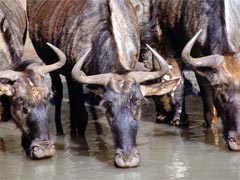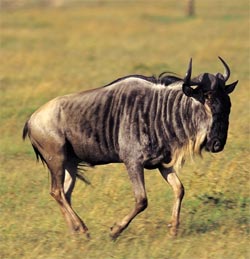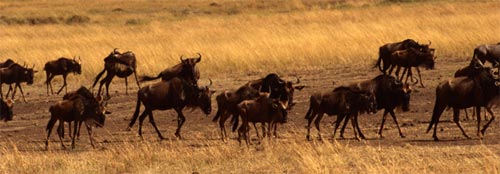|

 Just the Facts: Wildebeest grow to 1.15–1.4 meters (3'9"–4'7")
at the shoulder and weigh between 150 and 250 kilograms. (330 and
550 pounds) Just the Facts: Wildebeest grow to 1.15–1.4 meters (3'9"–4'7")
at the shoulder and weigh between 150 and 250 kilograms. (330 and
550 pounds)
They inhabit the plains and open woodlands of southern
Africa, especially the Serengeti. Wildebeest can live for more than
20 years.
What's for Dinner? The principal foodstuff of wildebeest are grasses.
The seasonal
nature of the African
grasslands forces wildebeest to make
annual
migrations.
The main migration is in May, when around 1.5 million
animals move from the plains to the woods; they return in November
as summer rains water the plains.
All in the Family: The cows will calve in summer,
on the plains. The calves can walk within minutes, and after a few
days can keep up with the rest of the herd. After calving the breeding
season begins. Dominant bulls defend territories marked with feces
and pheromones produced by scent glands on the hooves. Subordinate
males form bachelor herds.
 Eco-friendly: Wildebeest are an important part of the plains ecosystem. Their
dung fertilizes the ground and their eating and trampling encourage
new growth. They are also an important food source for predators
such as lions and hyenas. Eco-friendly: Wildebeest are an important part of the plains ecosystem. Their
dung fertilizes the ground and their eating and trampling encourage
new growth. They are also an important food source for predators
such as lions and hyenas.
What's in a Name? The name wildebeest finds its origin in the Dutch and Afrikaans words wild beest which means "wild animal/beast". Although the name is derived from the Dutch language, the name wildebeest doesn't officially exist in the Dutch language. The Dutch name for wildebeest is gnoe (where the Dutch "g" is pronounced) (as in: Loch).
Afrikaanders (Afrikaans speaking South-Africans) may have started using the name "Wildebeest" for the animal as they had no other name for it when it was first encountered. 'Gnu' is from a Khoikhoi language (which pronounced the [g]), which likely imitated it from the grunt-type noise that a wildebeest makes.
The pronunciation of 'gnu' was popularized in English by the comic song 'The Gnu' by Michael Flanders and Donald Swann, in which all words starting with 'n' have a 'g' prepended: 'I'm a g-nu, I'm a g-nu, the g-nicest work of g-nature in the zoo.'
'Gnu' is from a Khoikhoi language, which likely imitated it from
the grunt-type noise that a wildebeest makes.
Stampede! Wildebeest stampedes are notorious for the amount of destruction
they cause when they occur. An average stampede often features approximately
500 wildebeest traveling at speeds in excess of 65mph, and can
often last for about 30 minutes.

All text is available under the terms
of the GNU Free Documentation License
|